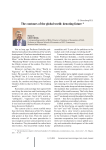Economic and Social Changes: Facts, Trends, Forecast @volnc-esc-en
Статьи журнала - Economic and Social Changes: Facts, Trends, Forecast
Все статьи: 1763
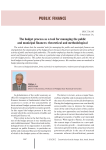
Статья научная
The article shows that the essential tools for managing the public and municipal finances are emerged from the organization of the budget process because this process permeates all areas of fiscal activity of public and municipal authorities. The author emphasizes that the changes in the economic, social and financial policy of the state at a particular stage of development of the country influence over the budget process. The author has focused attention on determining the place and the role of local budgets in the general system of the country's budget process. He considers some new methods in budget planning and forecasting.
Бесплатно
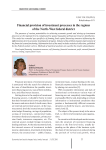
Статья научная
The possibility of application of a new Western paradigm as to the specially protected natural territories in the Extreme North of Russia is discussed in the article. It implies the combination of nature protection and neighborhood development. The author writes in brief about the new paradigm and the system of specially protected natural territories in the Murmansk Oblast. There are such problems of specially protected natural territories in the region as conflict of interest between different stakeholders, lack of support from the authorities and weak tourism infrastructure and competence in this sphere. However, the enthusiasm on the subject of local national parks and nature parks and a growing number of tourists allow us to suppose that the role of specially protected natural territories in the neighborhood development will be more significant in future.
Бесплатно
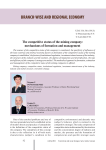
The competitive status of the mining company: mechanisms of formation and management
Статья научная
The essence of the competitive status of the company is considered, the specificity of influence of the basic external and internal economy factors on formation of the competitive status of the mining company is established, the factors of institutional regulation, investment attractiveness of the industry, the structure of the industry and the markets, the degrees of integration and diversification, the type and efficiency of the company's strategy are studied. The methodical approach to formation, estimation and management of the competitive status of the mining companies is offered.
Бесплатно
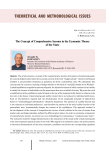
The concept of comprehensive income in the economic theory of the state
Статья научная
The article presents a concept of the comprehensive income of producers of patronized goods; the concept helped to determine the economic content of the term “budget subsidy”, which in the Russian tradition is unreasonably interpreted as gratuitous aid from a paternalistic state. We substantiate this concept and the economic meaning of budget subsidy on the basis of a modified model of the Wicksell- Lindahl equilibrium as applied to patronized goods, the distinctive feature of which consists in their ability to satisfy the interests of individuals and the government that acts on behalf of society. We prove that such a modification of the equilibrium model is based on the use of the marginal utility theory in relation to the key term in the theory of patronized goods: public interest that is not reduced to individual preferences. Such an interpretation required that the absolutization of the marginalist principle of subjectivism based on “methodological individualism” should be abandoned. The presence of a public interest that is not reduced to individual preferences, and therefore the presence of the social utility function of the paternalistic state, fundamentally changes the content of the equilibrium. This approach resulted in the development of the concept of comprehensive income, which is defined as the sum of income from market sales and budget subsidies, deflated by different price indices. In order to summarize components of comprehensive income, we present our own methodology for constructing a “composite price index”. The normative model for budget subsidy based on the assessment of the social utility of patronized goods is the most important practical result of our work. With regard to its normative nature, the article presents a theoretical substantiation of the three normative conditions and derives the corresponding equations for model calculations of the budget subsidy value, tested on the example of national and municipal theaters using actual departmental statistics for the period from 2009 to 2019.
Бесплатно
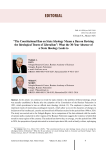
Статья научная
In the article, we continue to reveal the topic related to the problem of liberal ideology, which was actually established in Russia after the adoption of the Constitution of the Russian Federation in 1993, which proclaimed a ban on official state ideology (Article 13). The emphasis is placed on the empirical results of monitoring sociological research, which allow us to see the dynamics of changes in indicators of the intellectual, creative and moral level of Russian society for the period from 1996 to 2024. The study was carried out in the Vologda Region, but a comparison of the data obtained with the results of opinion polls conducted in other regions of the Russian Federation suggests the existence of identified trends in many regions of the country. The analysis has shown that, on average, over the period from 1996 to 2024, the proportion of people interested in various topics about life, such as family, culture, upbringing of younger generations, the life of the country and society, etc. decreased by 11 percentage points. The proportion of people who do not tend to engage in creative activities in everyday life has increased by 15 percentage points. The proportion of people experiencing remorse in the case of committing certain immoral acts (deception, rudeness, injustice, etc.) decreased by 8 percentage points. The generalization of expert assessments given in the article indicates that the cause of negative trends is largely the ideology of liberalism, which is based on the ideas of consumerism and money as the leading values in life, the understanding of benefit as the only driving force of social development. Special emphasis is placed on the values and behaviors of the ruling elites, who continue to adhere to the basic tenets of liberal ideology, which, in the context of the special military operation, leads to extremely negative consequences for the country and creates real threats to national security. Some of the ruling elites are still guided by liberal attitudes that contradict traditional spiritual and moral values such as justice, patriotism, and the priority of the spiritual over the material, which are contained in Presidential Decree 809 of November 9, 2022. Therefore, there is a growing need in the expert community and among the general public for a real understanding of the answer to the question “What kind of state are we building?” Our contribution lies in the analysis and interpretation of the database of sociological data accumulated from 1996 to 2024 in the context of current problems of public administration effectiveness.
Бесплатно
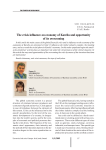
The crisis influence on economy of Karelia and opportunity of its overcoming
Статья научная
In this article the main causes of the global financial crisis and its influence on the economy of the autonomy of Karelia are presented in brief. It influences the timber industry complex, the banking area, and as a result the social sphere in Karelia’s economy. In this under-populated region the small-scale enterprises’ activity plays an important role under the circumstances of the critical situation. In this article the ways and opportunities of the overcoming the crisis by means of the invariant decisions are represented.
Бесплатно

The current state and specifics of small business development in Russia
Статья научная
The formation of the small business sector is one of the most promising areas of the country's socio-economic development. In this regard, assessing formation dynamics and determining the problems and areas of development of the sector is of particular relevance. The purpose for the research is to analyze the current state and identify the peculiarities of small business development in Russia. To achieve this purpose the following statistical research methods have been used: data summary and grouping, calculation of integrative indicators (absolute, relative values), construction of dynamics series. The author also used general scientific methods such as generalization, induction, analysis and synthesis, etc. Based on statistical data with the use of these methods, the author analyzed tendencies of small businesses development in the context of indicators characterizing the dynamics of a number of small enterprises and their territorial distribution, sectoral structure, employment in the small business sector, enterprise financial and economic activity, their lending, etc...
Бесплатно
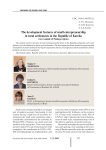
Статья научная
The authors analyze the state of small entrepreneurship sector in the Republic of Karelia and reveal features of its development in region rural settlements. The most urgent problems of small entrepreneurship development in rural settlements having low population density are designated and the possibilities of these problems decision are considered.
Бесплатно
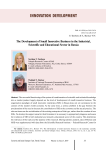
Статья научная
The successful functioning of the system of transformation of scientific and technical knowledge into a market product largely depends on the level of development of small innovative business. The organization paradigm of small innovative enterprises (SIE) in Russia does not yet correspond to the content of the modern world economy. At the same time, a serious problem is the gap between the proclamation of the need to increase the contribution of SIE to the economy and the actual practice. The relevant issues are the revitalization of the existing enterprises of this type, rather than the creation of new SIEs. To develop the support areas for their formation it is necessary to appropriately diagnose and assess the evolution of SIE in both industrial and research-educational sector of the country. This determines the relevance of the topic and the purpose of the research. During statistics analysis, data of Rosstat and HSE were supplemented with data from the Scientific Research Institute - Federal Research Centre for Projects Evaluation and Consulting Services (SRI FRCEC), as well as data from author surveys. The study reveals that the level of SIE development is insufficient to ensure economic security and does not meet the needs of the current stage of the country's economic development. It is revealed that in small enterprises, innovative activity along with financial and personnel issues, is hampered by management problems associated with the fact that the management of manufacturing process of innovative products requires a certain competence and the shift of the company's management resources from current activities. In view of this, the author proposes a model of SIE development management based on the implementation of the project management mechanism in conjunction with “SIE infrastructure”, ensuring the formation of SIE and strengthening its position in the market. We present the results of practical testing of this approach on real research objects, which provided the launch of 33 innovative projects during 2010-2017.
Бесплатно
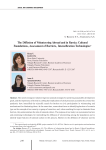
Статья научная
The need to integrate volunteering into national strategies for achieving sustainable development goals, and the importance of its role in curbing the implications of crisis processes caused by the coronavirus pandemic have intensified the scientific search for barriers to civic participation in volunteering and mechanisms for eliminating them. At the same time, researchers focus on identifying barriers of a certain type on the example of one country or group of countries, and, when searching for ways to eliminate those barriers, they underestimate the role of national culture. The purpose of our study is to systematize barriers and promising technologies for intensifying the diffusion of volunteering among the population and to identify major features of national culture in this process. Barriers to the diffusion of volunteer activity in society are systematized into three groups: barriers on the part of the state, barriers on the part of the non-profit sector, and barriers on the part of the individual. We show national features of their formation, which proceed from the specifics of emergence and evolution of volunteerism in the course of socioeconomic development. Using the postulates of institutional economic theory, we identify a system of institutions that intensify the diffusion of volunteering in society, including institutions for the promotion of volunteer practices, institutions for the development of civil society, institutions for the development of horizontal ties through network mechanisms for the diffusion of norms of civic participation, institutions for improving the reputation of volunteering among the population, the institute of volunteer education, institutions for increasing the motivation of participation in volunteering. On the basis of econometric analysis, we have determined that the cultural dimensions highlighted by G. Hofstede, such as the level of individualism, femininity and tolerance, have a significant impact on the extent of development of volunteering in the country. Taking into account the identified cultural features and effective technologies that promote residents’ engagement in volunteer activities, we determine directions for intensification of this process in Russia. Development of a comprehensive system of institutions for the diffusion of volunteering in our country will be a promising area for our future research.
Бесплатно
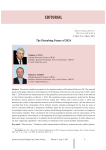
Статья научная
The article considers prospects for the implementation of Presidential Decree 204 “On national goals and strategic objectives of development of the Russian Federation for the period up to 2024” dated May 7, 2018 and for the implementation of key guidelines announced by the head of state in his Address to the Federal Assembly on March 1, 2018. We considered expert assessments, analyzed the Russian President’s annual phone-in session with the nation (the “Direct Line”) held on June 7, 2018, and discussed the results of international research and all-Russian sociological surveys. All this allows us to conclude that if the composition of the Cabinet remains virtually unchanged for the next six years, it will be extremely difficult to implement ambitious plans for the internal development of the country. According to many experts, if we want to achieve breakthrough development, it is necessary to change the Government radically. This is dictated by the current geopolitical situation and the expectations of the general population. Nevertheless, at the beginning of his fourth presidential term Vladimir Putin has not taken such steps; consequently, it is unlikely that he will fulfill his election promises. It rather allows us to say that “oligarchic capitalism” will continue to dominate in the system of public administration.
Бесплатно
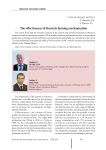
The effectiveness of livestock farming mechanization
Статья научная
The article deals with the economic analysis of the current state of milk production in Russia in comparison with the developed countries. The possibility of efficient milk production due to the advanced production technology and the methods of cow maintenance and milking are considered in the case of “Livestock Breeding Farm under the name of 50 Years of the USSR”, which is located in the Gryazovets District of the Vologda Oblast.
Бесплатно

Статья научная
The qualitative changes caused by the COVID-19 pandemic at all levels of the organization of the world community (individual, group, national, global) have actually formed a new social reality. Moreover, this process was of a force majeure nature; it took place in the conditions of a sharp increase in the uncertainty feeling, changes in the lifestyle of almost every person and every particular family, the unpreparedness of world medicine for an adequate response to the global epidemiological challenge, as well as the inevitability of large-scale problems in the economy and politics. The current conditions have become a challenge for the existing systems of public administration. The governments of different countries had to act quickly and decisively in order, on the one hand, to keep the development of the epidemiological situation under control, and on the other hand, to prevent a sharp deterioration of social stability against the background of objectively emerging epidemiological, social and psychological challenges. While the world medicine was urgently accelerating the development of a vaccine against coronavirus infection, the scientific and political community discussed the general strategy for implementing quarantine restrictions. However, against this background, the local community level remained virtually behind the scenes, which, nevertheless, was and still remains the most practical in terms of interaction of population with the authorities. It is at the local level (meaning the regional level, as well as the level of local selfgovernment) that the authorities are more close to the society problems, have the opportunity to interact face-to-face with its representatives, and the population, in turn, can actually participate in activities to improve living conditions (including solving problems caused by the pandemic). The article presents the experience of Russia and China in organizing interaction and evaluating the activities of local authorities by the population. Both countries have shown high efficiency in overcoming the crisis in 2020-2021, so their experience is of considerable interest, primarily in practical terms. The authors of the study have concluded about the importance of public assessment regarding the effectiveness of the activities of local authorities, as well as the prospects for actively involving citizens in solving problems arising against the background of force majeure.
Бесплатно
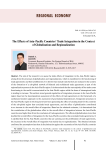
Статья научная
The aim of the research is to assess the trade effects of integration in the Asia-Pacific region, arising from the processes of globalization and regionalization, which is manifested in the functioning of trade agreements and their proliferation. It is shown that mutual trade barriers are reduced in the context of the formation of a sub-global network of bilateral and multilateral trade agreements as part of the regionalization process in the Asia-Pacific region. It is determined that the vast majority of free trade zones functioning in the world is concentrated in the Asia-Pacific region while the share of intraregional trade is tending to increase. The authors reveal general regularities of integration processes in the Asia-Pacific region based on the decomposition assessment of the effects of trade agreements in the framework of a synthesized modern approach to the assessment of gravitational dependencies. Integration processes in the Asia-Pacific region in the long term have been generating the effect of creating trade for the countries of the sub-global region that concluded trade agreements, and the effect of globalization contributed to an increase in the overall effect of integration. Based on the obtained estimates, it is determined that the contribution of the globalization effect to the overall effect of integration between the Asia-Pacific countries was higher than from the conclusion of trade agreements. The effects of globalization more than doubled the overall effect of integration for the Asia-Pacific countries that concluded trade agreements. It is clarified that for the Asia-Pacific countries that are carrying out the proliferation of trade agreements, the increase in the overall effect of integration was mainly due to regionalization. The obtained estimate confirmed the assumption that there is discrimination against the economies of the Asia-Pacific countries that do not expand the geography of concluded trade agreements in the region. Based on the obtained estimates, it is argued that the effective strategy for Russia is to increase the coverage of the Asia-Pacific countries to conclude trade agreements in order to diversify foreign trade and support export-oriented sectors of the economy.
Бесплатно
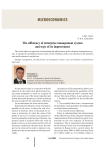
The efficiency of enterprise management system and ways of its improvement
Статья научная
The article offers an approach to determining the effectiveness of the enterprise management system. A strategy for development of the system in the conditions of the crisis observed in the domestic and world economy is worked out.
Бесплатно
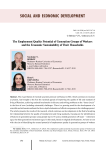
Статья научная
The exacerbation of external sanctions pressure on Russia in 2022, which continues to increase at present, has brought to the fore the national agenda of improving the quality of life and standard of living of Russians, achieving national benchmarks in this area and solving problems on the “inner circuit” in the face of new (including existential) challenges. There is a growing need for the development of a scientific and informational basis for the in-depth elaboration of effective responses to the challenges posed. The article presents the results of the research, which continues our developments in the field of studying the relationship between the quality of employment and living standards, focusing on the identification of features in generation groups: young people (up to 35 years), middle generation (36 years - retirement age), the older generation (retirement age). In this study, based on original developments, we have set out with the aim of identifying the unused potential of employment quality in generation groups of workers and its connection with the economic (un)sustainability of households, which determines their standard of living. The empirical basis was the data from the Russia Longitudinal Monitoring Survey of the HSE and the Comprehensive Monitoring of Living Conditions of the Population by Rosstat. The potential quality of employment of generation groups of workers is revealed, which is determined by the mismatch between education and employment (mismatch between the level of education and specialty, required in the workplace), the presence of precarious employment revealed on the basis of the indicators we have proposed. We consider the dynamics of economic sustainability of workers' households, determined on the basis of our developments and formed by the income from employment in generation groups of workers, as a whole and depending on the characteristics of the quality of employment. The results of this study allow us to update public policy decisions in the areas of employment and vocational education to improve the performance of the chain “education - employment - economic sustainability - standard of living”.
Бесплатно
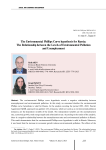
Статья научная
The environmental Phillips curve hypothesis reveals a negative relationship between unemployment and environmental pollution. In this study, we examined whether the environmental Phillips curve hypothesis is valid for Russia. In the analysis covering the period 1992–2022, Fourier Augmented ARDL approach was applied. CO2 emissions, which are used as an environmental pollution indicator, are the dependent variable of the model. The independent variables are the unemployment rate, economic growth, total energy supply and urbanization rate. According to the results of the analysis, there is a negative relationship between the unemployment rate and environmental pollution in Russia. This result demonstrates that the environmental Phillips curve hypothesis is valid in Russia. Moreover, it was found that the increase in economic growth reduces environmental pollution. The effects of the total energy supply and urbanization on environmental pollution are positive. However, the effect of the urbanization rate on environmental pollution is statistically insignificant. Russia should harmonize its employment policies and environmental policies with each other. The share of renewable energy use and total energy supply should be increased, and green job policies should be established. By increasing employment opportunities in sectors that use environmentally friendly technologies, Russia can reduce environmental pollution without suffering high unemployment rates.
Бесплатно
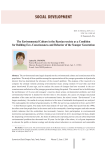
Статья научная
The environmental state largely depends on the environmental culture and consciousness of the population. The study of these qualities among the representatives of the younger generation is of particular interest: this has determined the relevance of the research problem. The purpose of the research is to compare the attitude towards pressing environmental issues among modern 16-year-olds and their peers interviewed 20 years ago, and to analyze the causes of changes that have occurred in the eco-consciousness and behavior of the younger generation during this period. The research lies in the following: the performance of 16-year-old teenagers’ concerns about serious environmental problems and their environmental behavior is studied for the first time in two decades; the causes of changes (decreased attention of the state and the society to environmental issues; the school course “Environment” is no longer mandatory; the media do not pay attention to the issue of sustainable development) are analyzed...
Бесплатно
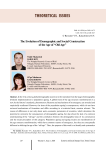
The evolution of demographic and social construction of the age of "old age"
Статья научная
In the 21st century, global demographic system is in the transition from the stage of demographic dividend implementation to population ageing. A global trend of the age structure transformation is a new, by the history’s standards, phenomenon. Reasons and mechanisms of its emergence are revealed and empirically confirmed. However, the issue of the population ageing’s consequences, which do not have universal mechanisms of formation and differ according to a territorial basis, remains relevant. The reason of differences is not only about socio-economic parameters of countries, which determine the potential to overcome the consequences of demographic ageing, but also about the lack of a common understanding of the “old age” and the correlation between the demographic basis of its construction and the social perception of this category. Population ageing and ageing society are manifestations of the age structure transformation, which have common reasons of emergence, but they are conceptually different in defining the age of the “old age”. Thus, the purpose of this work is to identify and systematize the evolutionary features of demographic and social construction of the age of the “old age”. The article consists of two main parts: the analysis of existing approaches to constructing the age of the population’s demographic “old age” and features of the transformation of public perception of elderly population in different historical epochs (social construction of the studied category). The main conclusion of the study is that within global, irreversible (with a narrowed reproduction) ageing of the population and demographic beta-convergence, the construction of the age of the “old age” gradually moves into the social area. Societies restructure the concept of the old age not only through the prism of increasing life expectancy (including healthy), but also through awareness of the increasing role of the older generation in maintaining sustainable rates of the socio-economic development. On this background, the main task of “ageing” states is to overcome the persistent (albeit on a less significant scale) manifestations of age discrimination against older citizens.
Бесплатно

